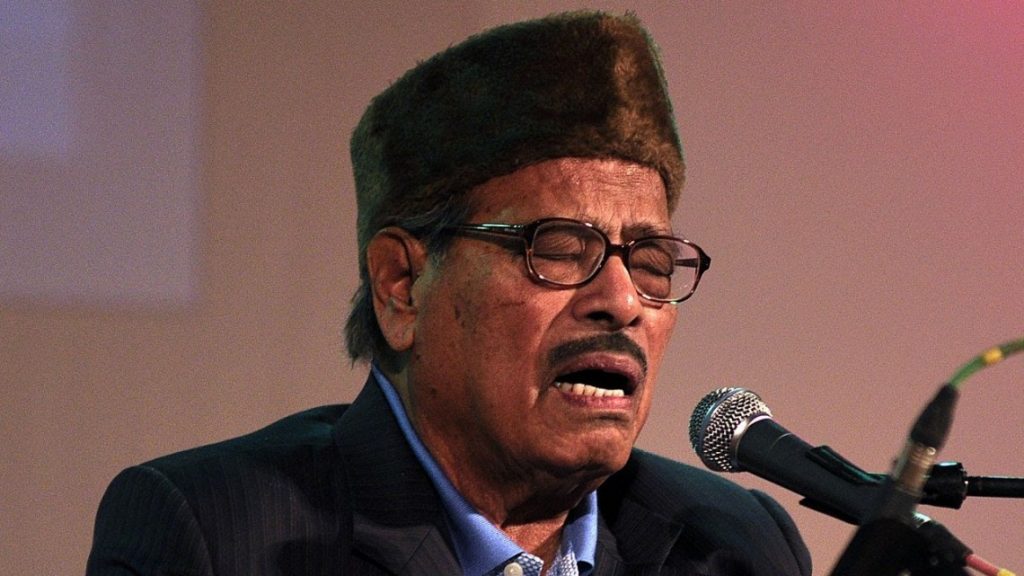When Chetan Anand was making a war movie based on the latest India-Pakistan conflict, there was one love song that was to be picturised on an IAF officer. They wanted a singer who could display a bit of gravitas while expressing his romantic feelings. It was a tall order but they knew just the man who could tick both the boxes – Manna Dey. The song was ‘Har taraf ab yahi afsaane hai/Hum teri aankhon ke dewaane hain’ from Hindustan Ki Kasam (1973).
Be it a melody, rustic or urbane, folk ballad, love song for vintage protagonists, a spirited qawwali, songs lightly or heavily drenched in classical music, a musical battle between rival musicians, philosophical musings, Prabodh Chandra Dey, aka Manna Dey, was the singer Bollywood turned to.
Not bad going for someone whose initial and heartfelt objective in life was only to be a wrestler.
Quite an accomplished grappler in his days at Vidyasagar College in Kolkata, the young Dey, as we learn in his autobiography Memories Come Alive (2007), took training from professionals and even reached the finals of the All Bengal Wrestling Competition.
“My only ambition now was to win the final and be acclaimed as India’s best wrestler. Shunning the call of music all through my childhood and adolescence, I had aspired to be a champion wrestler…,” Manna Dey wrote.
Then fate took a hand. While he had trained his body, his eyesight grew worse. Even wearing spectacles during bouts proved to be counter-productive and even injurious, when they broke once. A distraught Dey had to give up his primary dream, and take the subsidiary one of music – with some prompting and support from his uncle and noted singer-musician KC Dey.
It was KC Dey, who was also the mentor of Sachin Deb Burman, who took his nephew to Bombay in the earlier 1940s. Again, a chance encounter here as some hapless producers turned to him, after his uncle turned down a playback offer, launched a career that spanned from pre-Independent India to the first decade of the 21st century.
The film was Tamanna (1942) and Manna sang a duet ‘Jago aayee usha panchhi boley jago’ with Suraiya. And, as the cliche goes, there was no looking back.
While songs such as ‘Ae mere pyaare vatan’ from Kabuliwala (1961), ‘Ae meri zohra-jabeen’ from Waqt (1965) and ’Zindagi kaisi hai paheli, hai!’ from Anand (1970) are some of his best, let us for a moment celebrate Manna Dey, a day after his 103rd birth anniversary, to showcase some of his eclectic, known and less-known, songs, picturised on heroes and supporting characters alike.
We can begin with that song of sonorous grandeur from Mashal (1950), starring Ashok Kumar and Nalini Jaywant, where Manna, with ‘Upar gagan vishal neeche gahraa pataal’, does a full-throated rendition of legendary poet Pradeep’s masterful depiction of the place of man and his world in the wide cosmos.
Manna was the only male singer to work for the prestigious RK banner during the heyday of Raj Kapoor and his preferred voice, Mukesh. He began on other actors, like the masterly ‘Lapak jhapak tu aa re badarva’ in Boot Polish (1953), filmed on veteran character actor David, but then he went on to sing for Raj Kapoor in Shree 420. ” (1955). ‘Ai bhai zara dekh ke chalo’ in Mera Naam Joker (1970), as well as all songs in the non-RK banner Chori Chori (1956), where Manna weaves a spell in ‘Yeh raat bheegi bheegi’.
Manna’s defining song for Raj Kapoor, however, is the masterful ‘Laga chunri mein daag’ from Dil Hi To Hai (1963). A second less known could be the sombre ‘Ek paon chal raha alag alag’ in Kal Aaj Aur Kal (1971), an ignored masterpiece of cross-generational value conflicts, featuring three generations of the Kapoors for the last time.
But there was a lot more of his work in the 1950s and 1960s.
Encapsulating an entire saga in a song, with a remarkable cadence, is ‘Nirbal se ladayi balvan ki, yeh kahani hai diye aur toofaan ki’ from Toofan Aur Diya (1956), the inspirational story of a young orphan’s coming of age in a treacherous world. Satish Vyas was the protagonist, with support from Nanda, and Rajendra Kumar.
There was however one duet that made Manna develop cold feet when he learned who his co-singer was. As the story goes, he went for discussions with music composers Shankar-Jaikishan and found he would be singing with Pandit Bhimsen Joshi.
A worried Manna excused himself, fled home and told his wife that he was going out of town to evade this. She counselled him that he could not escape it unless he quit altogether. He then pulled himself together and went back to the studio. The result was the superlative ‘Ketaki gulab juhi champak ban phoole’ from Basant Bahaar (1956).
It takes special gumption to sing along, let alone face off against Kishore Kumar in a male duet – but Manna has done both. ‘Ek chatur naar kar ke singar’ in Padosan (1968) is a cult favourite, but equally madcap and exuberant is the ‘Babu samjho ishaare hauran pukaare’ in the Kumar brothers’ Chalti Ka Naam Gaadi (1958).
